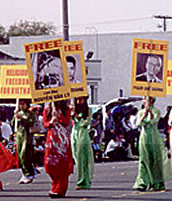|
Continue on page 2
Forced Repatriation
In the post-9/11 era, one of the crucial issues facing Southeast
Asian Americans is the U.S. policy of deporting persons who are
arrested, but who are not U.S. citizens, to their homeland, a practice
enabled by the USA Patriot Act. Unfortunately, many parents who were
hindered by the English-language requirement of the citizenship test
did not apply for U.S. citizenship for their children. This has
principally affected Cambodian Americans, since the U.S. government
convinced the Cambodian government to sign an agreement in 2002
permitting the “return” of deportees. This means that Cambodian youth who were raised primarily in the United States and have committed a minor offense are being deported to Cambodia even after serving their time, even though they know no one there and can barely speak the language. Nonprofit legal groups have advocated on behalf of Southeast Asian Americans unfairly kept in detention or facing deportation.
Evolution of Political Agendas
 As Southeast Asian American communities expand, they will have increasingly diverse
agendas based on factors such as political beliefs, class backgrounds, and religious
viewpoints. As the second and third generations who have been socialized mainly
in the United States come of age and become engaged in politics, community agendas
will change. Meanwhile, tensions will exist between generations as they negotiate
strategies and agendas. The challenge is to identify leaders who can represent
the varying interests of the communities while also navigating the mainstream
political system. It will also be crucial to the democratization process to determine
what kinds of alliances Southeast Asian Americans can form in the future, with
both other Asian American groups and other communities of color such as Latinos
and African Americans. As Southeast Asian American communities expand, they will have increasingly diverse
agendas based on factors such as political beliefs, class backgrounds, and religious
viewpoints. As the second and third generations who have been socialized mainly
in the United States come of age and become engaged in politics, community agendas
will change. Meanwhile, tensions will exist between generations as they negotiate
strategies and agendas. The challenge is to identify leaders who can represent
the varying interests of the communities while also navigating the mainstream
political system. It will also be crucial to the democratization process to determine
what kinds of alliances Southeast Asian Americans can form in the future, with
both other Asian American groups and other communities of color such as Latinos
and African Americans. 

|


